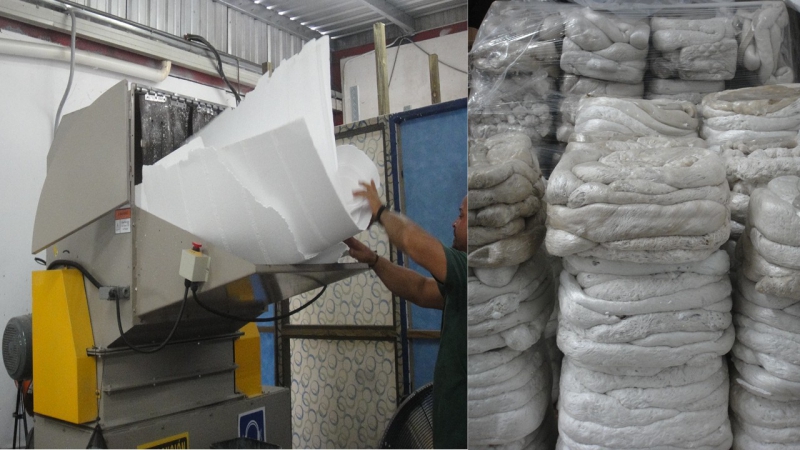 Intelligence, education, and energy formed the ideal scenario to take
a calculated risk and create more than a business, a market, in a
Puerto Rico industry that very few acknowledge and most ignore:
recycling. Intelligence, education, and energy formed the ideal scenario to take
a calculated risk and create more than a business, a market, in a
Puerto Rico industry that very few acknowledge and most ignore:
recycling.
After researching, travelling, meeting and negotiating, environmental consultant Liz Howell and her husband, Engineer Fernando Colón, took a leap of faith in 2011 and bet on a foam recycling program that would be the first in Puerto Rico, opening a recycling market for this material locally. The couple invested about $15k in equipment only, and an undisclosed amount in rent and other startup costs. Yo Reciclo (I Recycle) set its operation in Caguas, nearby Agrocentro Ochoa. Since Yo Reciclo began its operation on March 2012, it has prevented more than 2,500 cubic yards of foam from reaching landfills; which is more foam than the typical pharmaceutical manufacturing plant generates in a year. “Solid waste management has always been a concern for me and I wanted to do something about it. Puerto Rico imports about one million pounds of Styrofoam per year, for manufacturing processes only. This number doesn’t include consumer-packaging foam! Once Styrofoam exits the manufacturing plant, it ends up in the landfill within 30 days. To make matters worse, some landfills are not even accepting foam because, due to its volume, it reduces the landfill’s useful life quicker than other materials,” said Howell, whose company currently has less than 5% of the potential market. The remaining 95% goes to landfills while, in Asia, 60% of the used foam is recycled. Even with the amount of Styrofoam (#6) imported and the million pounds of other types of foam reaching landfills —such as Polyethylene, or PE (#4), and Polypropylene, or PP (#5)— Howell and Yo Reciclo still find it challenging to receive a steady stream of material to recycle. “The amount of material we get comes mainly from industrial and commercial businesses; very few residential, but we do accept it. Our clients have the option of dropping off the material in our facility or using our pickup and hauling service. Our services help companies save money in disposal costs because we help them reduce the volume of their waste,” said Howell. In an effort to tackle the residential foam waste, Yo Reciclo and the municipality of Caguas have a pilot collection program in 3 locations. Foam deposited in the bins at these locations is recycled rather than ending up in a landfill. “Unfortunately, we don’t close the recycling cycle in Puerto Rico, meaning that we don’t have—nor there is in Puerto Rico—a manufacturing plant that can take our product and recycle it into new products. What we do is shred the materials into pieces and apply heat densification to reduce its volume. We mold it, package it and export it. It gets recycled into toys, soles for tennis shoes, and phone protector cases, among many other products,” said Howell. Howell mentioned she would like to see other municipalities and collection centers involved in the process. “If they invest in the equipment, we can take care of maintenance, or we can train their team to give it the proper maintenance. Additionally, we purchase the material they produce and export it along with what we produce.” As with any startup, there have been challenges. But Howell and her husband have faced them with determination and a positive attitude. “Everything has been challenging, from doing market research to finding the ideal location and receiving financing. The data we were able to find was two years old, but we had to go with it because it was the only data available. PRIDCO’s list of facilities didn’t work for us because the buildings were too big, so we had to look ourselves. And nobody had faith in us, so it was hard to get financing. The only way we could get some money to invest was through Doral bank’s program for women entrepreneurs. Finally, after we started a market that didn’t exist, we had dishonest and illegal competitors within six months. It has definitely been a learning process,” recalled Howell. Regardless, Howell says that starting a business is not the destination. “As entrepreneurs, we must continue learning, adapting and innovating. We have to bust the myths and remain positive.” By Gina M. Hernández | gina@switchroad.com |






